Expert Witness: July 2011
Ofori Amponsah/Nigeria 70
Feeling the Highlife
Friday, July 1, 2011
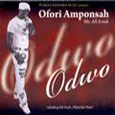 Ofori Amponsah: Odwo (Supermusic '07)
Ofori Amponsah: Odwo (Supermusic '07)
In Twi and in English, highlife new jack Amponsah has one of those
tenors you assume is a falsetto until he feels obliged to spend
quality time up even higher, as on the self-pitying "Nothing but Love"
or the pitying "Homeless," the sentimentality of which would be easier
to resist were it more contained and also if there weren't so many
homeless African children. More often he's a cheerleader, as on
"Highlife Dancing," with its good Ghanaian sunshine, and "Babicue,"
where champagne will be served. So sweet he has no need for Auto-Tune,
he butters it on anyway, and as with the sentimentality the music just
gets more beautiful as a result. He tries so hard you'd be a cad to
tell him no. A MINUS
 Nigeria 70: Sweet Times: Afro-Funk, Highlife & Juju From 1970s Lagos (Strut)
Nigeria 70: Sweet Times: Afro-Funk, Highlife & Juju From 1970s Lagos (Strut)
As with 2008's Lagos Jump, the boon is that the "funk" is so
tentative--mostly a few chicken-scratch guitars that barely
qualify. The bass lines lope and what trap drumming there is owes
nothing audible to Jabo Starks or Ziggy Modeliste. Strut says none of
these recordings has ever been released outside Nigeria, and indeed,
when I pulled down my vinyl on Dele Abiodun's 15-minute keeper "It's
Time for Juju Music" I learned that it had indeed been manufactured in
the mother country. Such little-heard luminaries as Victor Olaiya and
Ebenezer Obey stake their claims, and I enjoyed Ali Chukwumah's
un-chicken scratch "Henrietta" so instantaneously I assumed I'd
already heard it somewhere--which it would appear that I had
not. A MINUS
Teddybears/Russian Futurists
Pop Heat from Northern Democracies
Tuesday, July 5, 2011
 Teddybears: Devil's Music (Big Beat/Atlantic)
Teddybears: Devil's Music (Big Beat/Atlantic)
Where the nominally similar Gorillaz are cool and detached, Teddybears
want the world and they want it soon. Early in the lead track Eve--you
remember Eve--utters, in fact sings, "I am the robot Elvis rocking my
bionic pelvis/I'm Technotronic sipping vodka tonics yeah I'm selfish/I
am the Killer shaking up some more rock and roll," at which point a
vocodored Patrick Arve, Joachim Ahlund, or (most likely) Klas Ahlund
murmurs, "Them drum machines ain't got no soul." Joke or gauntlet? The
cheap answer is both, but let's make it gauntlet. Not afraid to be
funny because they're having so much fun, Arve-Ahlund-Ahlund are one
more electrobeat-wielding Swedish cartel bent on proving that rock and
roll proceeds from enlightened capitalism like we had in America
before our plutocrats started expanding the national income gap up
past Colombia's. As soon as Eve is through, here come B.o.B. exulting
about how he's gon' "Get Mama a House," Wayne Coyne having a go at
"Crystal Meth Christians," Cee-Lo and the B-52's praising a pussycat
who happens to be named "Cho Cha." There's also some unusually
cheerful Krautrock and the antidrug "Cardiac Arrest," featuring the
Teddybears' close personal business associate Robyn, who's why they
got to make another U.S. album. Last one was Soft Machine,
2006. Sounded good then. Now it sounds like rock and roll busy being
reborn. A
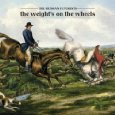 The Russian Futurists: The Weight's on the Wheels (Upper Class)
The Russian Futurists: The Weight's on the Wheels (Upper Class)
Throwing off his electrofuzz duvet, bedroom-pop solitary Matthew Adam
Hart ambles over to a handy recording studio, where he dispenses with
comforting layers of echo as if he's finally decided to let the
obscure objects of his desire understand his intentions. A few tunes
do some stretches, and then a young woman decides it's worth her while
to look good too. Soon she and Hart are back in the bedroom, but
together, spending "the rest of the night under the covers." Hart
suffers his usual second thoughts: "I don't even know what it's like
to be honest." But the warmth they shared sticks with him. Maybe he's
finally decided that in Toronto you need all the warmth you can
get. A MINUS
Shabazz Palaces
Having Nothing to Do With NOI Cosmology Unless You Want to Think It Does
Friday, July 8, 2011
 Shabazz Palaces: Of Light (Switchblade Music/Templar)
Shabazz Palaces: Of Light (Switchblade Music/Templar)
Ishmael Butler surfaced as Digable Planets' Butterfly, briefly led the
electrofunk CherryWine a decade later, and then sunk from view until
the near simultaneous 2009 release of two illegibly documented alt-rap
EPs--even determining Butler's involvement required investigative
reporting. Lead track on the first promises both "ideology to go" and
"attack of the funky clones," but until the be-what-you-are closer,
the record delivers mostly clones or at least "clones," including
Butler as raggamuffin and a rent-a-thug calling out such "drug
pushers" as Osama, Bush II, and old-schooler Oliver
North. Fortunately, when the funk is this deep and weird, replicas
sound like singletons every time. A MINUS
 Shabazz Palaces: Shabazz Palaces (Switchblade Music/Templar)
Shabazz Palaces: Shabazz Palaces (Switchblade Music/Templar)
Rhyming dark and down over beats artier than Dilla's, the artist
currently known as Palaceer Lazaro dares you to pin him down. Although
the music is less peculiar than first appears, exotica guitar and
group-hey-with-foghorn and looped-mbira-tunelet don't exactly shout
street. Yet quietly but clearly, the rapper sticks to MC swagger,
casual criminality, partying till you wild out, "a lot of hopes and
wishes and dreams in here"--plus just enough cautionary reality to
keep his ideology fresh. Think of him as a locally based
documentarian--a "bright light on the dark side of town" with a cool
hand on the dimmer switch. A MINUS
Shabazz Palaces/Street Sweeper Social Club
Loud-Rap
Tuesday, July 12, 2011
 Shabazz Palaces: Black Up (Sub Pop)
Shabazz Palaces: Black Up (Sub Pop)
Play loud. I can't speak to the listening practices of the
post-illbient beatmakers whose tricks Palaceer Lazaro gathers together
and improves on like he's just been waiting for the go-ahead from
Tricky himself. But though I wouldn't be surprised if they blasted
everything at 10, I think of them as background guys best heard on de
facto dinner comps like, say, Mush Filmstrip (Frame 1). Don't make
that mistake on an album that improves mightily when the volume is
high enough to break the beats into components so they're impossible
to ignore. That way, there's no mistaking it for the aimless prog Sub
Pop probably hopes gullible white youngsters lump it with. Special
favorites for me are the children's-chorus loop turned
mbira-and-hand-drums on "An echo from the hosts that profess
infinitum," the kinetic drum'n'whatever of "yeah you," the
faux-woodwind-lick/surrogate-maracas-electroclicks/African-etc.-outro
of "Swerve . . . the reeping of all that is worthwhile (Noir not
withstanding)." But I like them all--the beats, that is. The titles
are for the gullible, and shouldn't give you the wrong idea about the
rhymes even though the beats are why you'll play
this. Loud. A MINUS
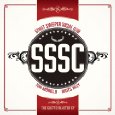 Street Sweeper Social Club: The Ghetto Blaster EP (SSSC)
Street Sweeper Social Club: The Ghetto Blaster EP (SSSC)
For Tom Morello to swap Zack De La Rocha for the smarter, funnier,
savvier, flowinger Boots Riley looked better than it sounded on the
resultant album, due partly to Riley's loss of lyrical bite and partly
to the musical falloff from Coup to mere Rage. But on this apparent
afterthought Riley sounds as mad as ever, calling out the pres by name
and declowning himself on "Scars (Hold That Pose)": "This old ripped
jacket is 'cause I am an artist/I'll burn rubber on you if my car'll
get started/Third month avoiding landlords is the hardest/It's only
funny 'cause you don't see where the scar is." And this being an EP,
there are killer covers. "Paper Planes" is subtly revised from a song
about how they'll take your money to a song about how we will. A
verbatim "Mama Said Knock You Out" becomes a threat. "Everythang" was
a Coup song to begin with. A MINUS
Rave On Buddy Holly/Grin
Rave On Teen Spirit
Friday, July 15, 2011
 Rave On Buddy Holly (Fantasy)
Rave On Buddy Holly (Fantasy)
High-profile film-music supervisor Randall Poster assembled quite the
high-profile cast to revive these 19 ancient titles. The Black Keys!
Cee-Lo Green! Florence + the Machine! My Morning Jacket! She &
Him! A whole bunch of rather dull yet commercially viable succès
d'estimes! But lo, handed the gift of Buddy's simple tunes and
simpler lyrics, they joyfully escape the craft-by-numbers of their own
compositions, leaving it to father figures Paul McCartney and Lou Reed
to disrespect Holly's classics and to materfamilias Patti Smith to
solemnize Holly's fluff--which they can, because they're Holly's
coequals. The way his heedless old songs liberate cautious young
professionals lays to rest any doubts as to whether he belongs in the
same pantheon as George M. Cohan and Irving Berlin. He just bequeathed
us a smaller book. A MINUS
 Grin: The Very Best of Grin Featuring Nils Lofgren (Spindizzy/Epic Associated/Legacy '99)
Grin: The Very Best of Grin Featuring Nils Lofgren (Spindizzy/Epic Associated/Legacy '99)
Lofgren is an even better argument than Buddy Holly himself for the
historically dubious proposition that rock and roll is the proper
province of inspired striplings, because he didn't die. Instead he
turned pro, grinding out dozens of overstated, unfulfilled albums
before and after Bruce Springsteen provided a use for an enthusiasm
that got pretty grotesque as his spontaneity vanished with his
chronological youth. Consisting entirely of material selected from or
contemporary with the three albums he released before he was 22, these
19 songs are dazzling evidence of the grace and spritz with which the
kid fused teen spirit and prodigious virtuosity--an evolved rock and
roll that articulates the romantic lyricism left implicit by
Holly. Nothing wrong with implication. But you can feel it rising up
in such unnecessarily obscure titles as "Slippery Fingers" and
"Everybody's Missin' the Sun." A
Jill Scott/Dave Alvin
Two (Very) American Humanists
Tuesday, July 19, 2011
 Jill Scott: The Light of the Sun (Blues Babe/Warner Bros.)
Jill Scott: The Light of the Sun (Blues Babe/Warner Bros.)
I agree, men are dogs. But it gets my radar in a lather when this
loving, lovable woman structures her 2007 album along a break-up's
narrative arc and then four years later the same thing happens
twice--only the first guy leaves her with a boychild who, let's be
candid, she loves more unreservedly than she has any grown man on
record. For instance, Anthony Hamilton, with whom she shares the
highly unconvincing "So in Love" duet right after a conversion
experience of an opener called "Blessed" and right before a well-nigh
womanist Eve duet. Other boons in a year when Adele has positioned
herself as the queen of solemn soul: the sub-two-minute "Quick," about
her babydaddy's attention span, and the four-minutes-plus "Making You
Wait," about how she needs to find out whether he's nuts first. Also
the Doug E. Fresh duet. A MINUS
 Dave Alvin: Eleven Eleven (Yep Roc)
Dave Alvin: Eleven Eleven (Yep Roc)
To call this the best record of his solo career isn't to claim it's
great, it's to reckon that it's pretty darn good. At 55, young Dave
has found his voice, which echoes somewhere on the outskirts of Johnny
Cash territory, and the songs strike old notes so truly they could be
new: loner quests (a half-blind Golden Glover, a bounty hunter with
nothing to lose), lost bard (Johnny Ace this time), union man (he beat
U.S. Steel and got beat anyway), sex in the present (he loves her
dirty nightgown) and past (one inamorata was a union maid on the
side). He even hooks up with his brother for some forced jocularity
that's the truest note of all. Remember when Phil was supposed to be
the singer? A MINUS
Serengeti
Complicated and Underrated
Friday, July 22, 2011
 Serengeti: Noticeably Negro (Audio 8 '06)
Serengeti: Noticeably Negro (Audio 8 '06)
In which Chicago alt-rapper David Cohn, a red diaper baby on his
African side, explores the conundrums of race and the hidden injuries
of class. His woozy flow gathers a musicality that combines Biz Markie
and Posdnuous--half wigged-out clown, half unassuming postcollegiate,
neither of which Serengeti is or pretends to be. This kind of
confusion is intrinsic to how he conceives hip-hop. A song called
"Negro Whimsy" is speckled with gunshots; a song called
"T.R.I.U.M.P.H." celebrates cabernet and Lucille's rack of
lamb. Occasionally, he stumbles into the gentility he parodies. More
often he blurs goofy and brilliant so organically that he's both at
once. A MINUS
 Serengeti: Family & Friends (Anticon)
Serengeti: Family & Friends (Anticon)
Where other rappers claim mere personas are "characters" (sometimes
inhabiting more than one on the very same album!), Serengeti writes
playlets with something like dramatis personae--not just a few
slightly confused rappers, although he has several of those, but white
working-class superfan Kenny, black garbage man Lee, hip-hop
dilettante Derek. Over beats supplied by Yoni of Anticon rap-rockers
Why?, who must envy his lyrics, and Advance Base, formerly known as
Casiotone for the Painfully Alone, he raps as or about 11 different
losers possibly including himself on 11 songs that last barely half an
hour. These include a son shooting up with his formerly absentee dad,
a bigamist who couldn't resist that 17-year-old, a privileged jerk who
lost his job and started a blog, and an ultimate fighter who blows his
knee out. Sure the tone is often depressive or satirical. But it's
also often kind, pained, silly, unhinged, and other things. On
Noticeably Negro, Serengeti asked: "Serengeti's very ill very
understated/Why'd you have to go and make things so complicated?" The
answer is that the world is complicated and he damn well knows
it. A MINUS
Lobi Traore/Sorry Bamba
Mali Gets Loud
Tuesday, July 26, 2011
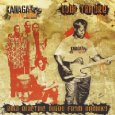 Lobi Traore: Bwati Kono "In the Club" (Kanaga System Krush)
Lobi Traore: Bwati Kono "In the Club" (Kanaga System Krush)
Although I've never heard this Malian guitarist's Bamako or
Bambara Blues, I admired his quick, clean, tightly hypnotic
1996 Segou--which hardly prepared me for either of the two
albums to appear since he died last year at 49. Rainy Season
Blues is one of those solo acoustic sitdowns that authenticity
fetishists pine for and I'm too crass to get through twice when the
songs are in English. This is the opposite--loud, electric band jams
from a late-night club in an early-to-bed city and "a well-known
Nigerian 'Hotel,'" whatever that means. I do ask myself why I'm more
likely to enjoy the form from the number five Malian guitarist than
from, say, Jeff Beck. Intensity of self-creation, partly, plus I
remain a big Hound Dog Taylor fan. Traore cuts Taylor. But the
10-minute "Ya Time" ("Someone who has lost their mother and father")
could actually pass for blues in the land of Ali Farka Toure, which
claims blues a lot more often than it gets within 3000 miles of
them. A MINUS
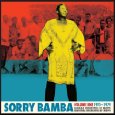 Sorry Bamba: Volume One 1970-1979 (Thrill Jockey)
Sorry Bamba: Volume One 1970-1979 (Thrill Jockey)
Before there was a Rail Band, this nobly born singer-trumpeter-flutist
led a dance troupe and a musical ensemble in the provincial Malian
city of Mopti. The Rail Band was more elegant and complex--Bamba was
no Salif Keita or Mory Kante vocally, and when Rail Band stalwart
Kanté Manfila steps up for a track here, the delicacy of his guitar
technique makes for a nice change. Bamba doesn't put forth a
consistent sound. He was in show business, and though his core
audience was more provincial than the travelers who came through
Bamako station, they liked having clave and Ethiopian horns and
baby-got-back mixed in with their griot-approved staples. But that's a
positive--fun, really. Combined with amenities only Bamba could
provide--his trumpet, his flute, his specialty in Dogon culture, and
most spectacularly a thousand-year-old showpiece featuring an
impossible hectoring chant for a long-departed emir--the groove that
asserts itself has crude satisfactions all its
own. A MINUS
The Staple Singers
A Paterfamilias Named Pops
Friday, July 29, 2011
 The Staple Singers: Freedom Highway (Columbia/Legacy '91)
The Staple Singers: Freedom Highway (Columbia/Legacy '91)
The genius of this one-of-a-kind family pop-gospel ensemble was
guitarist-vocalist-patriarch Pops. Roebuck, as his mama called him,
grew up on Dockery's Plantation in the Delta and heard the likes of
Charley Patton and Howlin' Wolf many Saturdays in Clarksdale. But
though his guitar always had more John Hurt than Rosetta Tharpe in it,
blues was not his calling. Married by the time he migrated to Chicago
in 1935, he worked hard jobs and moonlighted at music before gathering
progeny Pervis, Yvonne, Cleotha, and Mavis Staples into a group in
1948. The Staples' mastery of gospel's old-time virtuosic melodrama is
impressively documented on the 1956-61 Best of the Vee-Jay
Years. But sensing a more expansive audience and aesthetic in the
folk movement, Pops conceived the Milestone sessions on Great Day as
the civil rights movement heated up between 1962 and 1964. Then the
Staples moved on up to Epic and peaked. Vocals and guitar serving the
song more than on Vee-Jay, tempos faster and steadier than on
Milestone, they cheered up a mass movement with the certified classics
it deserved: "Will the Circle Be Unbroken," "Wade in the Water,"
"Samson and Delilah," "This Train," and also "For What It's Worth."
Mavis's growl provided essential bravura. But Pops's gentle baritone
led structurally and defined the mood. A
 The Staple Singers: Stax Profiles (Stax '06)
The Staple Singers: Stax Profiles (Stax '06)
On any Stax-Staples best-of there will be three indisputable
masterpieces: "Respect Yourself, "I'll Take You There," and above all
"Heavy Makes You Happy," composed by those great old soul men Jeff
Barry and Bobby Bloom. Sure some of the also-rans are better than
others, among them two of the three tracks here that aren't on the
more official-looking Best of the Staple Singers: the
family-tied "Everyday People" and the Movement-themed "Long Walk to
D.C." But even on perfectly enjoyable filler like "Touch a Hand, Make
a Friend" and "You've Got to Earn It," you can hear the Stax machine
groaning with the effort of squeezing Mavis's intrinsic grit and moral
intelligence into a soul stardom she never altogether got the hang of
and a contemporaneity by then better pursued with Willie Mitchell just
a mile away. A MINUS
MSN Music, July 2011
| June 2011 | August 2011 |
 RSS
RSS